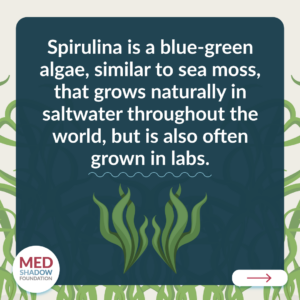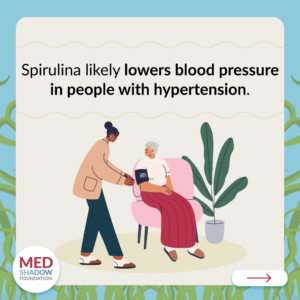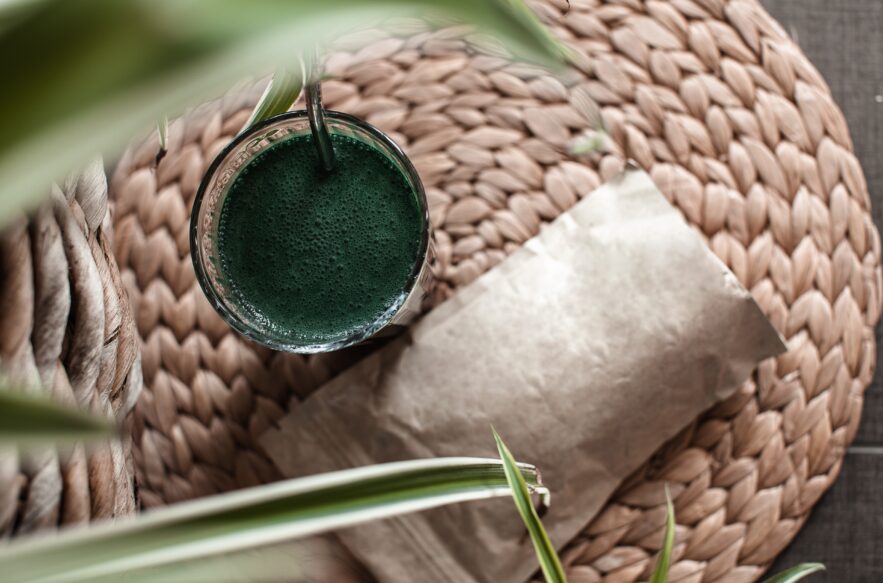[I]t seems there is always some hot new supplement trend that promises to cure any number of troubles. Spirulina is one of those trending in today’s markets. But what is this supplement, and what can it really do for you? Steve Brown does not recommend taking spirulina.
“I was expecting positive changes in my energy, digestion, and skin, but nothing happened” when he started taking it, he says. “I was disappointed and felt like I had wasted money on a useless product.”
Still, others report better outcomes from supplements. Therapist Aya Rechenburg, for example, says it helped her kick her coffee addiction and improve her focus.
You can find spirulina in many places, including oceans, lakes, laboratories, and supplement stores. Spirulina’s popularity has been on the rise for years. In 2021, consumers spent $480 million on the supplement, and that’s expected to more than double by 2030, to $1.166 billion.
There are a lot of claims out there about what spirulina might do for you, from improving your concentration, to lowering your blood pressure or healing your liver. Despite the fact that centuries ago the Aztecs may have been chowing down on bricks of spirulina the way many of us bite into blocks of cheese today, most of the research about its effects on our health is still very limited. Before you pull out your wallet, here’s what you need to know about spirulina.
What Is Spirulina Made Out Of?

Spirulina is a blue-green algae, similar to sea moss, that grows naturally in saltwater throughout the world, but it’s also often grown in labs. Spirulina is rich in a variety of nutrients including protein, iron, and antioxidants, but researchers are still teasing apart how these nutrients actually affect our health when we get them from spirulina. For example, it turns out that while spirulina was thought to be high in B12, it actually contains a pseudovitamin B12 that isn’t biologically active.
How to Take Spirulina
There are a variety of ways you can take spirulina. It’s a common ingredient in smoothies. It’s available as capsules, powders, gummies, and liquids that you can take alone or mix into foods and drinks.
Spirulina Benefits
While the science is still growing on spirulina, some positive impacts have been shown to improve some people’s health. So, what does spirulina really do?
Spirulina And Iron Levels
Spirulina can be a good choice for people following plant-based diets thanks to its high levels of protein and iron. In one study, people with ulcerative colitis—a disease of the intestines that can interfere with your ability to absorb nutrients from food—who took one gram of spirulina a day for eight weeks had higher levels of iron in their blood than those who took a placebo.
In a separate, very small study of only 17 cyclists, taking six grams of spirulina per day for 14 days, raised the levels of hemoglobin (a measure of iron) in their blood, but did not impact their endurance.
Spirulina and Blood Pressure, Cholesterol, and Obesity

Researchers analyzed five small studies in people with hypertension who took spirulina and found that it likely lowered hypertension. The studies were difficult to compare however, since they assigned participants to take anywhere from one to eight grams of the supplement per day for anywhere from two to 12 weeks.
Spirulina may also help with decreasing low-density lipoprotein (LDL) cholesterol which is considered “bad cholesterol,” and healing fatty liver disease, but the studies showing these effects are very preliminary.
Lastly, it may help patients with obesity lose a small amount of weight—about 6.5 pounds over three months—and improve insulin sensitivity.
Is Spirulina Good for the Liver?
Researchers have found signs that spirulina can improve liver health, but the findings are far from definitive. In one study, scientists gave 15 patients (mostly men) six grams of spirulina per day for six months and found that measures of liver damage in their blood went down by about a third.
How Much Spirulina Should I Take?
There’s no standardized dose of spirulina, but most studies on the supplement’s health effects used formulations that contained somewhere between one and eight grams of spirulina per day.
Side Effects of Spirulina

There are not very many documented side effects of spirulina, though, like any supplement, it can be contaminated. A study in mice found that the supplement might increase the activity of certain immune cells that could worsen autoimmune disease symptoms in some patients.
Jasmine Peterson, a personal trainer and nutritionist, says that when she first started taking spirulina she noticed “a slight digestive shift,” which she attributed to the supplement’s high fiber content. Fiber is known to bulk up stools and reduce constipation. To allow her digestive system to adjust, she lowered her dose, then gradually increased it.
As always, talk to your healthcare provider before adding a new supplement to your routine. It is crucial for your healthcare provider to know all of the medications you take, whether they are supplements, vitamins, over-the-counter products, or prescribed medications. Different products can interfere with, cause reaction in, or even lessen the efficacy of other medications, so be sure to be inclusive and honest about all of your daily intake.
How to Choose a Spirulina Supplement
Vitamins and supplements don’t get the same scrutiny from the FDA as drugs. The benefits and risks listed above are based on the assumption that your supplement contains exactly what is listed on the label, and nothing else. However, study after study has found that supplements can be tainted with pharmaceuticals or other contaminants that may cause additional side effects.
One way to reduce your risk is to check the label for a certification that the supplement has been tested by a third party. Groups like the National Science Foundation (NSF) or the United States Pharmacopeia (USP) test supplements to confirm that they contain the products listed on the label and don’t have unsafe levels of contaminants.






